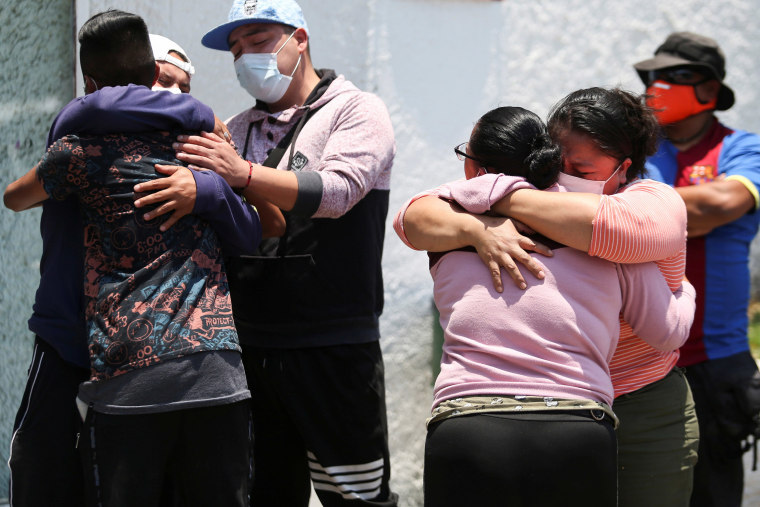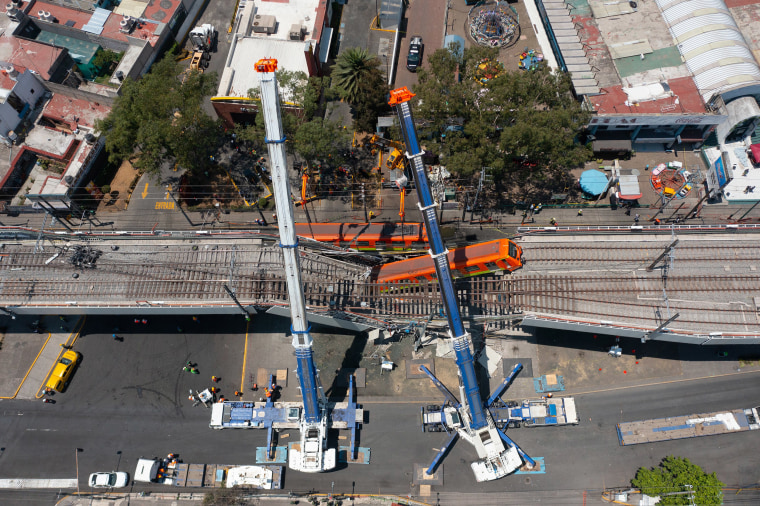MEXICO CITY — José Luis Hernández Martínez crossed Mexico City every day on subway Line 12 between his home on the city’s south side and the body shop where he worked repairing mangled cars.
The 61-year-old’s train had emerged from beneath the city and was jostling along the elevated portion far from downtown late Monday night when two of its bright orange cars suddenly fell into a void.
Hernández Martínez was killed instantly, his son Luis Adrian Hernández Juarez said, one of 24 people who died in one of the world’s largest subway system’s worst accidents. More than 70 others were injured.
“My father was recovered without vital signs, with trauma to his thorax, his brain, his feet, his knees,” Hernández Juarez said, gripping the death certificate. He said emergency personnel told him his father was crushed beneath other passengers. “It’s really terrible to see your father that way for the last time.”

Hernández Juarez planned to bury his father Wednesday as a string of funerals began across the city of more than 9 million people.
Download the NBC News app for breaking news and politics
Anger and frustration boiled among the victims’ families and those who ride the sprawling subway daily.
“No one is going to give me my father back, even if they give me 10 million pesos,” Hernández Juarez said, while expressing concern that his mother had been left without a source of income.
A preliminary review suggested a failure in the horizontal support beams caused the accident, authorities said.
Mayor Claudia Sheinbaum urged the public to avoid speculation and promised a thorough and independent investigation. Authorities expected to present a preliminary report on the accident Friday.
Line 12 is Mexico City’s longest and newest, but has been plagued with problems since it began operating in 2012. At its farthest point, it carries commuters from the capital’s still semi-rural south side to jobs across the city. Some 220,000 riders use Line 12 every day.
Early targets for the public’s ire were already emerging, among them the subway’s director, Florencia Serranía. Sheinbaum said she had not received any report about problems on Line 12 that suggested the possibility of a failure like the one Monday night.
Serranía said Tuesday that the line received a “very rigorous” daily inspection. It was also reviewed in June 2020 after an earthquake that was strong but did not cause significant damage in the city, she said. A city report in 2017 noted significant damage to a portion of the line after a 7.1 magnitude earthquake that year.
Foreign Relations Secretary Marcelo Ebrard, who was Mexico City's mayor from 2006 to 2012 when the line was constructed, was also feeling the heat. Widely viewed as a possible successor to President Andrés Manuel López Obrador, Ebrard said those responsible should be identified and he would make himself available to authorities.
While conclusions on what caused the accident could take months and assigning blame longer, many victims’ families were faced with the immediate needs brought on by the loss of their primary breadwinners.

Gisela Rioja also spent Monday night and Tuesday morning scouring the city’s hospitals for information on her husband, 42-year-old Miguel Ángel Espinosa Flores, who worked in a department store at a mall a few stops from where the accident occurred.
Rioja finally found him Tuesday at a morgue in the Mexico City borough of Iztapalapa. She described him as a hard worker, responsible and happy. She and their two children depended on him.
“I want justice for my husband because a simple apology is not going to bring him back to us,” she said. “He was my love; he was everything to me. It hurts so much, so much, so much because of the way it ended.”
Luisa Martínez sat outside city government offices in Iztapalapa on Tuesday afternoon awaiting the release of the body of her niece’s husband, Carlos Pineda, a 38-year-old dentist. Pineda leaves behind his wife and their two children ages 7 and 13.
“He was the one who supported the family. Now they are left without income,” Martínez said. “They have to compensate us now. I don’t want it in a year or two years like all bureaucratic procedures.”